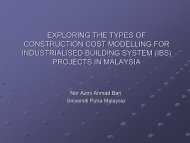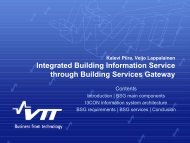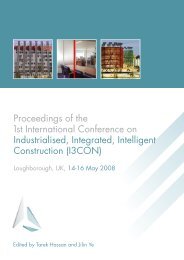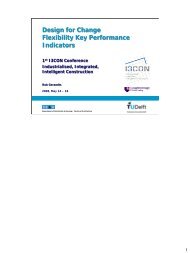Industrialised, Integrated, Intelligent sustainable Construction - I3con
Industrialised, Integrated, Intelligent sustainable Construction - I3con
Industrialised, Integrated, Intelligent sustainable Construction - I3con
You also want an ePaper? Increase the reach of your titles
YUMPU automatically turns print PDFs into web optimized ePapers that Google loves.
SUSTAINABLE CONSTRUCTION HANDBOOK 2<br />
University of Reading (United Kingdom), Universitat Stuttgart (Germany) and Purdue University<br />
(United States).<br />
The following courses of the MSc CME specialization block contain IT related subjects:<br />
88<br />
• Building Design and <strong>Construction</strong> Informatics. This course is an introductory course of<br />
theories, methods and techniques regarding the application of information and communication<br />
technologies, to improve the quality, efficiency and effectivity of design and construction<br />
processes. The main emphasis of the course is on information modelling and product data<br />
technology for the building and construction industry. The goal of the exercises is to familiarise<br />
the students with the basic skills of building information modelling using UML (Unified<br />
Modelling Language) as well as building feature modelling using ArchiCAD.<br />
• Knowledge Management (accompanying previous course in the list). The main emphasis of this<br />
course is on information management and knowledge technology for the building and<br />
construction industry. The goal of this course is to provide students with the fundamental<br />
knowledge and skills of IT tools in building and construction, including basic skills of process<br />
modelling using SADT techniques (IDEF0) as well as knowledge modelling using a real life<br />
case.<br />
• System Dynamics. This course deals with dynamic non-linear feedback systems on a high level<br />
of aggregation in order to develop hypotheses and conceptual models for complex (civil<br />
engineering) systems. A computer supported gaming and simulation environment for advanced<br />
simulation of non-linear problem-solving will be offered to the students.<br />
• Advanced System Design. In this course students (individual or as a group of two students)<br />
design, develop and implement a system for mainly a (building and civil) engineering problem.<br />
The emphasis of this exercise is on system development methods and techniques and the use of<br />
IT solutions. The goal of the exercise is to familiarise the students with practical aspects of<br />
system development, enabling them to employ IT-enabled tools whenever required for the<br />
purpose of their graduation project or during their professional work.<br />
Results<br />
The BSc Design Project courses described above have already been running for a number of years,<br />
with modifications almost every year. These courses generally function well. The students appreciate<br />
the courses and the lecturers share the opinion that students get a proper preparation for their role as<br />
designer/engineers.<br />
On the other hand, the Design Project courses have their limitations. The courses are in fact umbrella<br />
courses for a wide range of skills; students can develop these skills up to a basic level, but not much<br />
further. For example, they learn a little bit about how to run and manage a project, but they do not get<br />
a thorough education in project management, including theories, methods and different approaches.<br />
The same can be said for subjects as cost management, risk management, etc. The reason for this is<br />
that the Design Projects are used as a vehicle for many skills – and recently some new skills are added<br />
to the list, namely Geo Information and Drawing.<br />
For most aspects of design projects the training of so many skills in one course is not really a big issue<br />
for the BSc stage, as long as you do not expect too much from the students after these courses.<br />
An exception is, in our view, the ICT aspect. In the current design projects, ICT is only seen as a tool<br />
for doing design work. There is hardly any attention for the information modelling or information<br />
management aspect of a design project. This can be seen in the MSc stage, where students apparently<br />
have no idea of ICT and BIM as key supporting tools for complex design projects.<br />
The MSc tracks discussed in this chapter have a shorter history. The <strong>Construction</strong> Management and<br />
Engineering track started in 2007 and the first graduates left the university in 2009. In these few years,<br />
an enthusiastic community of CME students has formed (approximately 20-30 students per year). The






